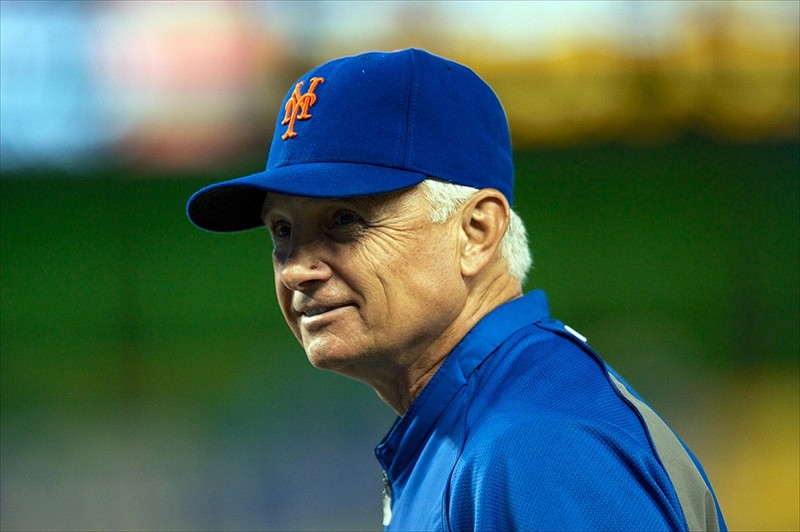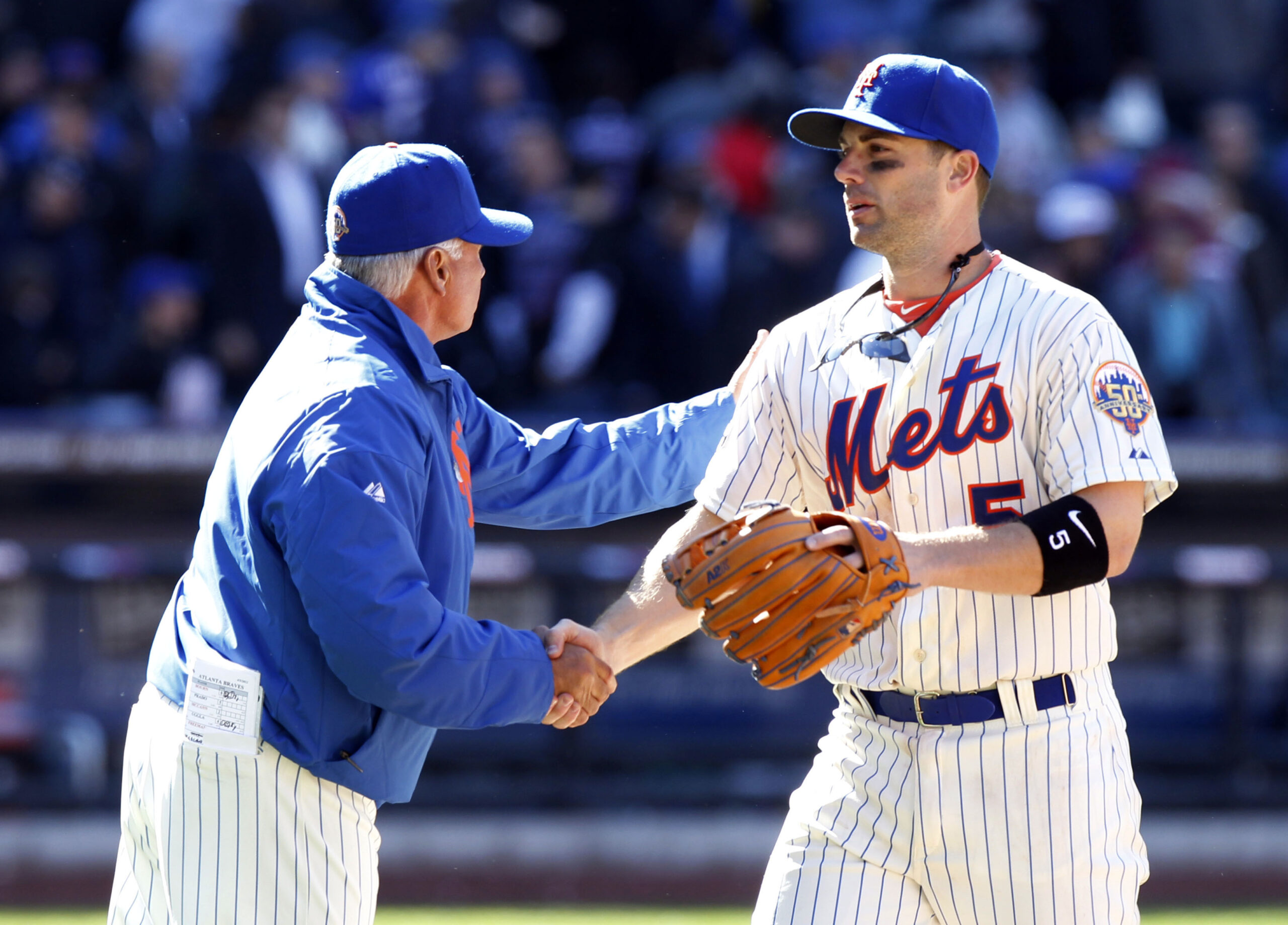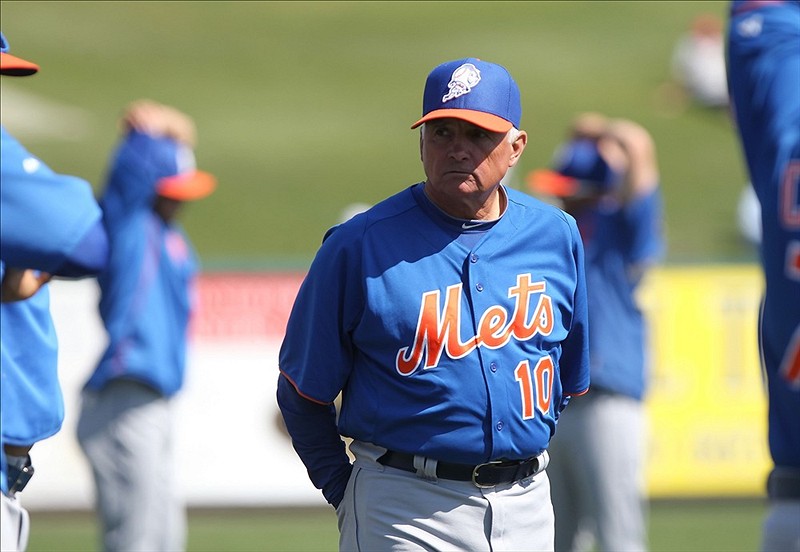 With Terry Collins’ contract due to expire at the end of this season, speculation is rife that along with a shift in the talent level (and hopefully the fortunes) of the team, a move may be made to replace the Mets’ skipper. GM Sandy Alderson having been typically circumspect when the question of a managerial extension has been broached, imaginations have run, if not wild, at least as far as the idea of his bringing in a new field boss to oversee the next phase of the team’s development.
With Terry Collins’ contract due to expire at the end of this season, speculation is rife that along with a shift in the talent level (and hopefully the fortunes) of the team, a move may be made to replace the Mets’ skipper. GM Sandy Alderson having been typically circumspect when the question of a managerial extension has been broached, imaginations have run, if not wild, at least as far as the idea of his bringing in a new field boss to oversee the next phase of the team’s development.
While history has taught us that the job security of a typical manager is often tenuous, I am genuinely puzzled with respect to this particular case. If the team’s consecutive 4th place finishes under Collins’ guidance are the primary focus of one’s judgment, it would be reasonable to point out that even Joe McCarthy would have had difficulty making trying to make Chicken Marsala out of the chicken feathers that comprised much of the Met roster over that period. When Alderson was brought aboard to reconstruct what had become a dysfunctional franchise, his choice of manager clearly signaled his recognition that a developmentally minded person would best serve his purpose. TC was a natural choice given his position as minor-league field coordinator for the organization as well as his wealth of experience.
Ah, but here lies the point of contention for some: as the organization seems poised to focus more intently on the immediate fortunes of the big league club, some would suggest that Collins’ skills might best be re-deployed. Let him focus on the farm again, and bring in an individual with a greater apparent “win now” approach to give the team the extra nudge it could have used during last year’s mediocre second half. Just how effective any particular managerial ploy would have proven for a team with the myriad weaknesses of last year’s squad is questionable, at best. For all the noise made this off-season regarding the team’s uncertain outfield, one has only to review the numbers of the 2012 corps to realize that outside of Scott Hairston, there was precious little evidence of quality. The same could be said of much of the bullpen and the catching corps, the latter evoking the old comparison to a box of Kleenex – they pop up one at a time, get it?
 Yes, there was the shining glory that was R.A. Dickey’s season, David Wright’s tremendous first half and Ike Davis’ big second half, Bobby Parnell’s emergence as a consistent reliever, the remarkable debut of Matt Harvey and the pinch hitting heroics of Mike Baxter and Jordany Valdespin. Alas, these were but isolated positive parts in a generally mediocre whole. But if one follows the logic of the Alderson plan, such seasons are necessary parts of an organizational transition. Place holders must be used while long term solutions are developed, and the results aren’t always pretty. Couple this with the observation that the Mets as team played over their heads during the surprising first half and you need to give credit to the manager. No one has ever accused Collins of lacking intensity, but translating it into an effective battle plan on the field requires a broader range of skills. The fact that the team’s level of success fell off significantly after the All Star break should really be viewed as regression to the mean. With four spots in the lineup taken up by Jason Bay, Andres Torres, one of last year’s catchers and a pitcher, this was never going to be an offense that would score consistently, and with a porous bullpen seemingly springing new leaks by the day, any lead was in constant jeopardy.
Yes, there was the shining glory that was R.A. Dickey’s season, David Wright’s tremendous first half and Ike Davis’ big second half, Bobby Parnell’s emergence as a consistent reliever, the remarkable debut of Matt Harvey and the pinch hitting heroics of Mike Baxter and Jordany Valdespin. Alas, these were but isolated positive parts in a generally mediocre whole. But if one follows the logic of the Alderson plan, such seasons are necessary parts of an organizational transition. Place holders must be used while long term solutions are developed, and the results aren’t always pretty. Couple this with the observation that the Mets as team played over their heads during the surprising first half and you need to give credit to the manager. No one has ever accused Collins of lacking intensity, but translating it into an effective battle plan on the field requires a broader range of skills. The fact that the team’s level of success fell off significantly after the All Star break should really be viewed as regression to the mean. With four spots in the lineup taken up by Jason Bay, Andres Torres, one of last year’s catchers and a pitcher, this was never going to be an offense that would score consistently, and with a porous bullpen seemingly springing new leaks by the day, any lead was in constant jeopardy.
The criteria used in judging a manager’s performance goes beyond the team’s won/lost record, of course, but at some point, the focus ultimately comes down to that stat. What has tempered expectations in the past few seasons is the realistic view that a rebuild was necessitated by a confluence of events well beyond the scope of who was writing out the lineup card. Now that the Met organization appears to be emerging from its 4 year malaise, it would stand to reason that fans would begin to get itchy for any move that might hasten the progress toward full-fledged competitiveness.
 However, rest assured, when the first stretch of losing play comes in 2013, there will be those who will label the team as “uninspired” or “underperforming” and begin clamoring for the installation of Wally Backman at the helm. While I have no doubt as to the scrappy pedigree of the current Las Vegas manager and sincerely hope he gets his shot at another big league position, I think that Collins is deserving of a chance to help bring the present Mets team he has helped nurture to the next level.
However, rest assured, when the first stretch of losing play comes in 2013, there will be those who will label the team as “uninspired” or “underperforming” and begin clamoring for the installation of Wally Backman at the helm. While I have no doubt as to the scrappy pedigree of the current Las Vegas manager and sincerely hope he gets his shot at another big league position, I think that Collins is deserving of a chance to help bring the present Mets team he has helped nurture to the next level.
An extension is in order, in my opinion, and the sooner, the better. The fact that the Mets’ brass has chosen to allow TC to enter the season with lame duck status is somewhat understandable due to Sandy Alderson’s admitted concerns regarding last year’s second half fall-off, but as previously mentioned, any review of team statistics during that period could just as well point to culpability on the GM’s part.
I am looking forward to the season, as I do every Met season, but with real expectation of there being a “surprise” team in Flushing that steps up their game in the second half rather than fading. Realistically, can we assert at this point that the Mets are poised to topple the Nats from their newly won perch atop the division? Probably not, but would an actual flirtation with the Wild Card be completely far-fetched? I don’t think so, at least for a good part of the season.
Given the horses, so to speak, I believe that Terry Collins can guide the ever-developing Mets to success. He has spoken of his own learning curve and development as a leader, and I believe that it is evident in the way he has conducted himself during the past two seasons. So, give him the horses, Sandy, and give him the opportunity to race them. He has earned it.















